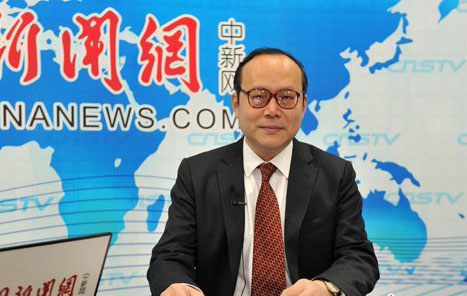|

|
|
Chen Xu, director-general of the Department of International Organizations and Conferences of the Chinese Foreign Ministry, answers questions from chinanews.com readers online on Jan 19, 2012. [Photo/Chinanews.com]
|
Q: Why did China cast affirmative votes on the UN Security Council Resolutions 1718 and 1874, agreeing to sanctions against the Democratic People's Republic of Korea (DPRK)?
A: China constantly hopes to maintain peace and stability on the Korean Peninsula and to achieve denuclearization in this area. The UN Security Council passed Resolution 1718 and Resolution 1874 in 2008 and 2009, respectively. The two resolutions illustrated the international community's consensus in opposing the DPRK's nuclear testing and also indicated the council's persistent determination to solve this issue through talks and negotiations. That policy is what we have always advocated. We, at all times, advocate that the Security Council's relevant actions should be helpful to maintain international nuclear non-proliferation, promote the denuclearization of the Korean Peninsula and maintain the region's peace and stability. That is why China voted to approve these two resolutions.
Q: What's China's attitude to Japan and India's bid for permanent seats on the UN Security Council?
A: The United Nations' reform is actually an old topic, which is a systematic project involving many aspects. Since the 1990s, the UN has carried out several rounds of reforms and received many achievements. But differences do exist among UN members on its reform.
China supports the Security Council's reasonable and necessary reform with the purpose of enhancing its authority and efficiency as well as improving its ability to respond to global threats and challenges.
The 193 members are mainly developing countries, so we think the reforms should give priority to increase the representation and voice of developing countries, in particular, the representation of African countries.
When talking about Japan and India's bid for permanent seats on the Security Council, China thinks highly of the two countries' positions and function in international affairs and keeps sound communication and coordination with them.
Q: How many times China has exercised veto? Why China often castes abstention votes?
A: China has exercised veto seven times since it regained a legal seat in the UN. The last one was to vote down the US and the UK's UN Security Council draft on Syria. Some citizens may think the Chinese authority is too soft when seeing China cast quite so many abstention votes.
I hope to share with our people here that China has always adhered to an independent and peaceful foreign policy, and judges every incident according to its right and wrong. Incidents related to the Security Council are always important and sensitive which need comprehensive and objective judgments before confirming our position.
Casting an abstention vote is not to say China has no stand. The abstention is one of the three positions laid down by the UN which offers a room for countries to decide their positions.
Let's take Libya as an example. We did have some reservations, but we cast an abstention, in consideration of the situation in Libya and the Arab League's position and other Arabian countries' stand.
Q: Why did China veto a Security Council resolution on Syria last year?
A: First, we always stick to the spirit of the UN Charter and the principle of non-interference in the internal affairs of other countries. The Syria issue is essentially an internal matter that should be resolved by the Syrian people. Second, the way we deal with the problem is to maintain peace and stability in the Middle East. Third, we don’t agree with the proposal by some countries, and believe that to exert pressure on Syria and even threaten to impose sanctions on it disregards the two factors above. That’s why we vetoed the Security Council’s resolution.
Q: What do you think of China’s human rights situation? How does China respond to the West’s criticisms on this issue?
A: Human rights is not an abstract concept. It includes political rights, social and cultural rights, and also the right to development. More than 30 years since the reform and opening-up policy, the living standard of Chinese people has been greatly improved. China has achieved big strides in the development of human rights and it has received praises from the international community.
Q: What is the current status of China’s participation in UN peacekeeping operations?
A: Since China started dispatching troops to take part in UN peacekeeping operations in 1989, its participation has gotten bigger and bigger in terms of range and scale. Till now, we have sent nearly 20,000 military personnel, police officers and civil affair officers on 28 UN peacekeeping operations.
At present, there are around 2,000 military personnel and police officers on peacekeeping duty in 12 areas. China is the biggest troop supplier for peacekeeping operations among the five permanent member of the Security Council, ranking 14th of all UN members.
